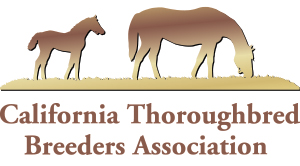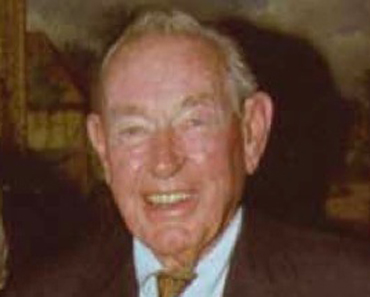By Jay Hovdey, DRF.com
RANCHO SANTA FE, Calif. (Nov. 30, 2014) — Dr. Jack K. Robbins, one of the sport’s true Renaissance men and patriarch of an influential racing family, died late Saturday afternoon at his home in Rancho Santa Fe, Calif., after a battle with the effects of pulmonary and respiratory disease. He was 93.
Robbins’s death sent a wave of sadness through a racing community that had gathered earlier in the day at Del Mar Racetrack, a few miles from his home, to witness the victory of California Chrome in the Hollywood Derby. Robbins was a regular at Del Mar, both morning and afternoon, until poor health curtailed his visits the last couple of seasons.
A native of Michigan, Robbins was born on May 28, 1921, and migrated to the West Coast with his mother upon his parents’ divorce. It was in California that Robbins went on to thrive as a Thoroughbred breeder, owner, and a racing empressario, but most of all he was universally recognized as a pioneer of racetrack veterinary medicine in an era when racehorses were pretty much at the mercy of barebones diagnostics and care.
“It was a good, ripe time to do basic things on a racehorse that had been overlooked,” Robbins said in a 1985 interview. “I was pretty conservative, but I tried to establish some basic programs for the trainer to stick to. I remember a filly of Bill Molter’s who ended up winning stakes from just getting rid of her worms.”
In 1954, reacting with colleagues to the negative perception of the increasing number of vets at the racetrack, Robbins helped found the American Association of Equine Practitioners as a watchdog organization and served for 22 years on the AAEP’s ethics committee.
“We reviewed violations by the AAEP members and sometimes had to punish or discharge them,” Robbins said.
Robbins first became interested in racing while living in the San Francisco suburb of Hillsborough, not far from Bay Meadows. One day in April of 1932, the young racing fan learned of the sudden death of the great Phar Lap, who’d just won his North American debut at Caliente.
“It happened nearby, in Menlo Park, and it was all over the newspapers every day,“ Robbins said. “He was quite a story, one of the best who ever lived.”
Through family connections, Robbins landed a summer job at Conejo Ranch, which was part of the extensive Ed Janss holdings to the north and west of Los Angeles that later became the communities of Thousand Oaks and Westwood. It was at Conejo that Robbins, age 15, got his first experience with Thoroughbreds.
“Later on my stepfather wanted me to go to work in his bakery,” Robbins once recalled. “It was Ed Janss suggested the idea of becoming a veterinarian.”
After prepping at Exeter and graduating from UC Berkeley, Robbins completed his pre-veterinary schooling at the University of California-Davis and then earned his VMD –Veterinariae Medicinae Doctoris – from the University of Pennsylvania. But that’s not all.
“I was waiting tables at a sorority house, Kappa Kappa Gamma,” Robbins said. “Maggie was the president. She wasn’t paying any attention to me. So I spilled some soup in her lap, then later I asked her out. Her father was a mortician, and they were an old Philadelphia family. But I guess I passed muster.”
Jack Robbins and Margaret “Maggie” Miller were married in 1944 and had four sons, all of whom have been involved at the highest levels of racing at some point. Jay Robbins trained 2000 Horse of the Year and Hall of Famer Tiznow. Don Robbins, an attorney, is a former president of Hollywood Park. David Robbins, also an attorney, has had numerous industry clients through the years, while Tom Robbins is vice president of racing at Del Mar.
On the day Tom was born, Robbins was at the track, tending to one of his patients. Both the horse and baby Tom were fine, but Robbins decided that his boys deserved to grow up in an environment with more stability than racetrack life offered. So he returned to Conejo as farm manager, family in tow, and stayed there from 1956 to 1961, then went on to manage the Laguna Seca Ranch of Frank and Connie Bishop from 1962 until 1967 before returning to his racetrack practice.
Robbins worked with some of the all-time West Coast greats of the past 60 years, including Hall of Famers John Henry, Ancient Title, and Native Diver. He also gets the credit for gelding Native Diver and Ancient Title, as well as Quicken Tree, winner of the Santa Anita Handicap and Jockey Club Gold Cup.
“Native Diver, that was an easy decision,” Robbins said. “He was a rascal. Ancient Title was a big, husky dude. He kept coming back lame from the track. We found out it was one of his testicles bothering him. That’s when we decided to geld him.”
As for John Henry, trained by Ron McAnally, Robbins attested to the champion’s nasty disposition.
“You didn’t want to go in that stall without Jose,” Robbins said, referring to groom Jose Mercado. “But if John Henry was a vet’s only client, he’d starve.”
In addition to McAnally and Molter, Robbins lent his veterinary skills to Hall of Famers such as Horatio Luro, Charlie Whittingham, Bobby Frankel, Gary Jones, Richard Mandella, and Ben and Jimmy Jones, who tabbed the young vet, only a few years out of school, to work with the California string of their Calumet Farm runners beginning in late 1949. The stable included Citation, Ponder, and Bardstown.
“Working for Calumet at that time was like being the trainer who worked for the Yankees during their Bronx Bomber days, with guys like DiMaggio and Gehrig,” Robbins said. “You were working on the best Thoroughbreds of the era.”
Robbins was a member of the California Thoroughbred Breeders Association for more than 50 years. With his wife and a variety of partners, Robbins bred and raced a number of fine Thoroughbreds, including the major winners Most Host, Nostalgia’s Star, Honeys Gem, Cassaleria, Smasher, and Guilton Madero.
In 1969, Robbins was one of the founding directors of the Oak Tree Racing Association, whose non-profit model of pumping money back into the game has looked more and more prescient with every track ownership crisis that rocks the sport. Oak Tree also made a mark on many of racing’s most progressive ventures, from the National Thoroughbred Racing Association, to racing channels TVG and HRTV, to the veterinary research programs spearheaded by UC Davis and Grayson-Jockey Club Foundation. During Oak Tree’s 40-year run, the association hosted the Breeders’ Cup at Santa Anita five times.
“I was always very proud of the fact that we were a non-profit, non-dividend paying group,” Robbins said of Oak Tree, which lost its Santa Anita lease in 2010. “Our intention was to present first-class racing which in turn would fund improvements to the quality of life on the backstretch, as well as important veterinary research.”
Robbins retired from his full-time racetrack practice in 1982 but retained a small coterie of clients. He joined Rollin Baugh’s International Thoroughbred Consultants and later became an adviser to the Elmendorf Farm operation of sports magnate Jack Kent Cooke and to the fledgling stable of Allen Paulson.
Among the many honors bestowed upon Robbins through the years was recognition as the 2002 Honored Guest of the Thoroughbred Club of America, the Joe Palmer Award from the National Turf Writers and Broadcasters Association for meritorious service to racing, the Distinguised Life Member Award of the AAEP, and the Bellwether Medal and Citation of Gratitude from the University of Pennsylvania School of Veterinary Medicine.
Last month, Robbins was among the West Coast racing notables enshrined in the City of Arcadia Walk of Champions, near Santa Anita Park.
Robbins was preceded in death by Margaret Robbins in 2013. Besides his four sons, Robbins is survived by eight grandchildren and three great-grandchildren. The family said a memorial service will be planned.


